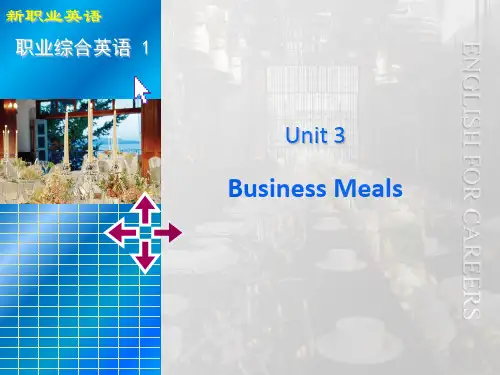新职业英语素质篇UNIT3(精选)
- 格式:ppt
- 大小:3.95 MB
- 文档页数:78
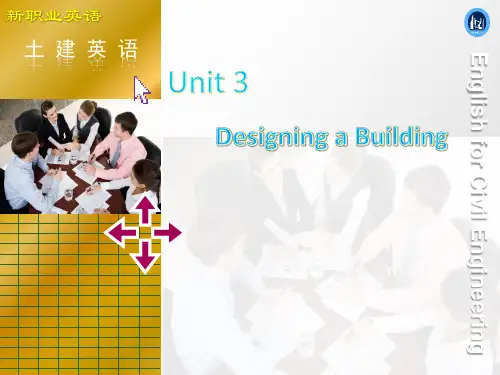

职业英语第三单元作文范文In the ever-globalizing landscape of business, the significance of professional English cannot be overstated. It is the key that unlocks the door to international collaboration and the cornerstone of effective communication within diverse teams. This essay delves into the third unit of our professional English course, which focuses on the nuances of business communication and the mastery of language skills that can elevate one's career.The third unit of our course is a pivotal chapter in the journey to becoming a proficient communicator in the professional realm. It emphasizes the importance of clarity, conciseness, and the appropriate use of jargon in business settings. Through a series of engaging lectures and interactive workshops, students are equipped with the tools necessary to navigate the complexities of professional discourse.One of the most impactful lessons from this unit is the art of writing effective emails. In today's fast-paced corporate world, email is often the first point of contact with colleagues and clients. Learning how to craft messages that are both professional and personable can significantly enhance one's professional image. The unit teaches students to structure their emails with precision, using appropriate salutations, clear subject lines, and concise body text that conveys the intended message without ambiguity.Another critical aspect covered in the third unit is the mastery of presentation skills. The ability to present ideas with confidence and clarity is a hallmark of successful professionals. Through role-playing exercises and peer evaluations, students are encouraged to hone their public speaking abilities. They learn to construct compelling narratives, use visual aids effectively, and engage their audience with a confident and dynamic delivery.Moreover, the unit delves into the subtleties of negotiation and the language of persuasion. It is here that students learn the delicate balance between assertiveness and diplomacy. They are taught to use language that builds bridges rather than walls, to understand cultural differences in communication styles, and to employ strategies that lead to mutually beneficial outcomes.The third unit also places a strong emphasis on active listening and feedback. Effective communication is not just about speaking; it is equally about listening and responding thoughtfully. Students are trained to listen attentively, to interpret non-verbal cues, and to provide constructive feedback that fosters growth and collaboration.In conclusion, the third unit of our professional English course is a transformative experience for anyone aspiring to excel in the international business arena. It is a comprehensive guide to the art of communication, providing students with the skills and confidence to communicate effectively in any professional context. As we progressthrough the course, it becomes increasingly clear that mastering professional English is not just about learning a language; it is about understanding the culture of business and the power of words to inspire, persuade, and lead.。
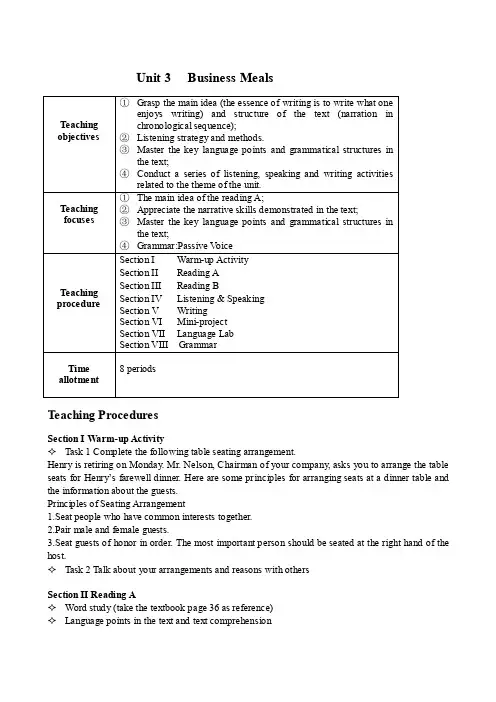
Unit 3 Business MealsTeaching ProceduresSection I W arm-up Activity✧Task 1 Complete the following table seating arrangement.Henry is retiring on Monday. Mr. Nelson, Chairman of your company, asks you to arrange the table seats for Henry’s farewell dinner. Here are some pr inciples for arranging seats at a dinner table and the information about the guests.Principles of Seating Arrangement1.Seat people who have common interests together.2.Pair male and female guests.3.Seat guests of honor in order. The most important person should be seated at the right hand of the host.✧Task 2 Talk about your arrangements and reasons with othersSection II Reading A✧Word study (take the textbook page 36 as reference)✧Language points in the text and text comprehension1. entertaine.g. I’ll entertain my friends over the weekend.The child was entertaining himself with his toys.2. build upto build; to increase, or become bigger or stronger graduallye.g. They have built up a good reputation.The noise built up until she cou ldn’t stand it any longer.3. formala. appropriate for official or serious situations or occasionse.g. I only wear this suit for formal dinners.Our boss is very formal; she doesn’t call anyone by their first name.4. implyv. to make something understood without expressing it directlye.g. I do not imply that you are wrong.5. urgencyn. something very important and needing to be dealt with immediatelye.g. Well, take it easy! It isn’t a matter of urgency.6. companyn. the state of being with someonee.g. Rita’s husband is away for the week, so I thinkI’d better go over and keep her company.7. turn outto have a particular result; to happen in a particular waye.g. That man we met turned out to be Maria’s second cousin.Don’t worry. I’m sure it will all turn out fine.8. payv. to bring a good result or advantage for someonee.g. It usually pays to tell the truth.9. be on one’s best behaviorto behave as well and politely as you can, especially in order to please someonee.g. I want you to be on your best behavior at Granddad’s.10. knowledgeablea. (of a person) knowing a lote.g. Dick is very knowledgeable about wines.11. see sb. through (something)to help someone continue doing something, especially something difficult or unpleasant,until it is finishede.g. This overcoat has seen me through many severe winters.He saw me through all the hard times.12. intelligenthaving a high level of mental ability; good at understanding ideas and thinking quickly and clearly e.g. All teachers regard Jimmy as an intelligent student.intelligentlyad. in an intelligent waye.g. Y ou have to speak intelligently at this important business meeting.13. come in handyto be usefule.g. I’ll put these bottles in the cupboard—they might come in handy someday.Reading A—Language points in14. conductv. to behave in a particular way, especially in a situation where people judge you by the way you behave;to carry oute.g. Public figures have a duty to conduct themselves responsibly.The company conducted a survey to find out what their customers think about the newproduct.15. concentrate (on)v. to think very carefully about something that you are doinge.g. She was concentrating on her book and didn’t know what had happened.16. sought-aftera. wanted by a lot of peoplee.g. Doctors are the most sought-after people in the area.✧After-reading exercisesTask 1 Read the passage. Then match the business meals with their characteristics.Task 2 Decide which of the following behaviors are Do’s or Don’ts for business meals according to the passage.✧Business know-howGiving Gifts●Give gifts during special holidays, or as "thank-yours" for special invitations;●Do not give expensive gifts;● A small cultural gift from your country is usually appropriate;●Package your gift nicely, with a card attached to it.Section III Reading BReading it to get the main idea and do the exercises followed.Section IV Listening & Speaking✧Task 1 Peter is meeting a guest at the airport. Listen to the co nversation and choose the bestanswer to each question you hear.✧Task 2 Listen to the conversation and fill in the blanks with what you hear.✧Task 3 John works in Season Hotel. He is receiving a phone call. Listen to the conversation andfill in the hotel reservation form below.✧Task 4 Listen to the conversation and decide whether the following statements are true or false.Then write key words to support your answers.✧Task 5 Listen to the passage twice and fill in the blanks with what you hear.Section V Writing✧Task 1 Work in pairs. Discuss the questions below.1. On what occasions do people send and receive invitations?2. What information is usually included in an invitation?✧Task 2 Read the invitations below and complete the following statements.1. The dinner for ________________________ will be held at Grand Hotel.2. Sarah invites her friends to ___________________.3. “RSVP” means ___________________________________________________.5. Bob invites Lisa to _______________.✧Task 3 Write an invitation to one of your classmates. And when you receive an invitation,make a response by accepting or declining it.Section VI Mini-projectWork in groups. Search online for the rule of table setting for a western dinner. Then set the following tableware and explain to the class.✧Work in groups;✧Search the Internet for rules of table setting;✧Pay attention to the functions of different pieces of tableware;✧Good time management and cooperation;✧In-class oral presentation.Section VII Language lab✧Task 1 Match the words or phrases on the left with their meanings on the right.✧Task 2 Complete the following sentences with the words or phrases from Task 1. Change theform if necessary.✧Task 3 Rewrite each of the following sentences with the words or phrases given in thebrackets. Change the form if necessary.✧Task 4 Rewrite the following sentences after the models.✧Task 5 Translate the following into English using the given words or phrases. (take the textbookpage44-45 as reference)Section VIII GrammarPassive V oice (被动语态)语态是动词用以说明主语和谓语之间关系的一种形式,英语有两种语态:主动语态(Active V oice)和Passive V oice (被动语态)。
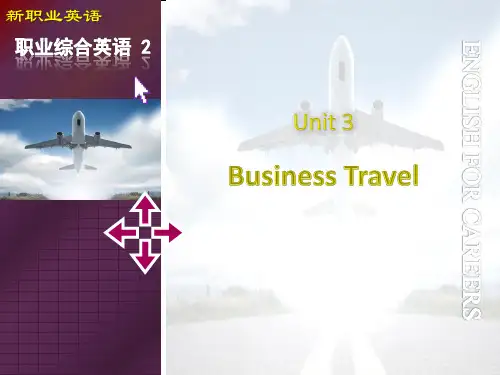
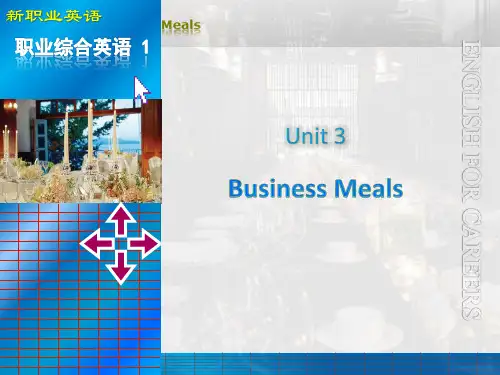


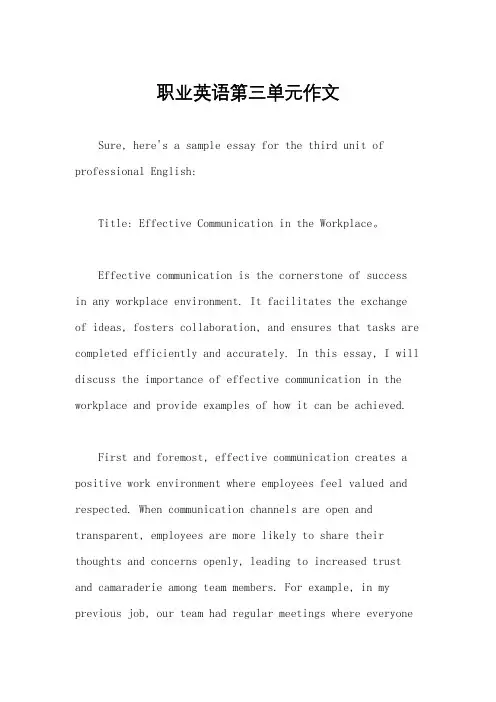
职业英语第三单元作文Sure, here's a sample essay for the third unit of professional English:Title: Effective Communication in the Workplace。
Effective communication is the cornerstone of success in any workplace environment. It facilitates the exchange of ideas, fosters collaboration, and ensures that tasks are completed efficiently and accurately. In this essay, I will discuss the importance of effective communication in the workplace and provide examples of how it can be achieved.First and foremost, effective communication creates a positive work environment where employees feel valued and respected. When communication channels are open and transparent, employees are more likely to share their thoughts and concerns openly, leading to increased trust and camaraderie among team members. For example, in my previous job, our team had regular meetings where everyonewas encouraged to voice their opinions and offer suggestions for improvement. This not only helped to strengthen our bond as a team but also led to innovative ideas that ultimately benefited the company.Furthermore, effective communication is essential for ensuring that tasks are completed accurately and on time. Clear instructions and expectations help to minimize misunderstandings and reduce the likelihood of errors. For instance, when working on a group project, it is important for team members to communicate effectively regarding deadlines, responsibilities, and any potential obstacles that may arise. By keeping everyone informed and on the same page, tasks can be completed more efficiently, leading to greater productivity and success.In addition, effective communication plays a crucial role in conflict resolution. Conflicts are inevitable in any workplace, but how they are handled can make all the difference. By fostering open communication and active listening, conflicts can be addressed and resolved in a timely manner, preventing them from escalating into largerissues. For example, I once encountered a conflict with a coworker over the allocation of resources for a project. Instead of ignoring the issue, we sat down and had a candid conversation about our concerns. Through open communication and compromise, we were able to find a solution that satisfied both parties and allowed the project to move forward smoothly.Moreover, effective communication is essential for building strong relationships with clients and customers. Whether it's answering inquiries, addressing concerns, or providing updates on projects, clear and concise communication helps to build trust and confidence in the company's products or services. For example, in my current role, I often communicate with clients via email or phone to provide updates on their projects and address any questions or concerns they may have. By ensuring that communication is timely, professional, and informative, I am able to maintain positive relationships with clients and ultimately contribute to the success of the company.In conclusion, effective communication is vital forsuccess in the workplace. By fostering open communication, clarity, and active listening, employees can work together more efficiently, resolve conflicts, and build stronger relationships with clients and customers. As such, it is essential for companies to prioritize effective communication strategies and provide employees with the tools and resources they need to communicate effectively. By doing so, they can create a positive and productive work environment where everyone can thrive.。
